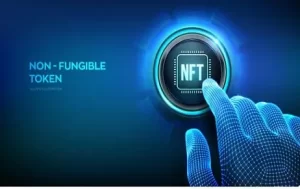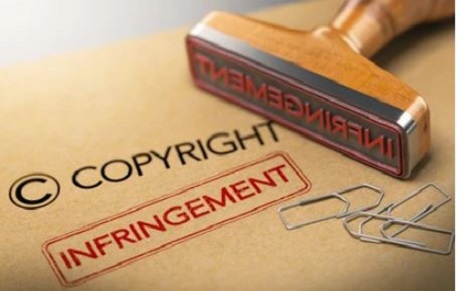Introduction Artificial intelligence (AI) has emerged as one of the biggest game-changers in recent years…
Understanding The Liability of Net Marketplaces in Copyright Infringement.
Introduction
Non-Fungible Tokens (NFTs) are the representation of ownership of an underlying asset on a blockchain. The asset is linked to the blockchain, and since each block of the blockchain is unique in its identity, it makes the NFT exclusively available only to the owner of the NFT. Thus, tokens are non-fungible as they cannot be exchanged for another token, such as, for example, a hundred rupee bank note. In the case of banknotes, all the hundred rupees notes have the same value and are ideally substitutable. However, in the case of the NFTs, the tokens have unique identities and are thus non-fungible.
[Image Source: Freepic]

Nft Marketplace- How It Works
NFTs are purchased and sold on an NFT marketplace. These marketplaces host the NFTs and facilitate the creation, hosting, sale and purchase of the NFTs. The NFT marketplace is comparable to other marketplaces, and intermediaries like Amazon and Facebook, where the individuals host their contents and the purchaser access them for purchase.
Further, it is essential to understand that the underlying asset of the NFT is saved not on the blockchain itself but on a third-party file-saving platform. An instance of the work, i.e. the link of the said work, is then linked to the blockchain to make the system efficient, lighter and faster.
How Can Nfts Infringe Copyright?
The underlying asset in the NFT can be any work as mentioned under section 2(y) of the Copyright Act. Under the Act, the ‘work’ includes a literary, dramatic or artistic work. NFTs tokenise the work and convert it into a digital form. Thus, any work which is copyrightable under section 13 of the copyright act and forms the basis of the NFT is protected under the copyright act. Section 13 of the copyright act includes broadly 3 classes of work, namely,
i. Original literary, dramatic, musical and artistic works;
ii. Cinematograph films;
iii. Sound recording.
From the face of the section and nature of NFTs , musical, cinematographical and literary works are protected by the copyright act. However, the large NFT market is based on memes and artworks. Safe for such NFT producers, these types of work are protected under the meaning of ‘artistic work’. Section 2(c) defines the ambit of ‘artistic work’. Such work includes, among other things, painting, drawing, photograph, whether or not any such work possesses artistic quality etc. Further, a ‘photograph’ includes any work produced by any process analogous to photography but does not include any part of a cinematograph.
It is thus evidently clear that memes, arts, drawing, animations etc., all fall under the classification of work as defined under section 13 of the copyright act and are protected under it. Further, since NFTs are a digital manifestation of work, it is analogous to the work itself and thus attracts infringement clauses of the Copyright act.
For instance, a person who is not the owner of a copyrighted work creates an NFT of the same and reproduces the same as mentioned under section 51 of the copyright act shall be said to be infringing the copyrighted work. However, the contentious point is the liability of the marketplace when a seller puts up infringing material on it for sale. Whether the marketplace shall be liable for publishing the material or shall they have a defence of being an intermediary under the IT Act, 2000?
Discussing The Liability Of Online Marketplaces
However, before the question of liability is examined, the online marketplaces’ role must be examined. The online marketplace of NFTs felicitates the sale and purchase of the NFTs. The marketplaces like Openseas, Superare, and Bored Ape Yacht Club do not create, or more technically valid, ‘mint’ the NFT. These marketplaces act as a medium between the creators of the NFTs and the purchaser. The process is autonomous from the marketplaces’ side, and the content is not approved or accepted by them. Therefore, it shall still be the creator of the NFT who shall be primarily liable for any infringement of the copyrighted work.
However, the copyright act also provides that publication of the copyrighted work is also an infringement. Section 51(a) provides as follows,
“Section 51. When copyright is infringed. -Copyright in work shall be deemed to be infringed-
(a) when any person, without a licence granted by the owner of the copyright or the Registrar of Copyrights under this Act or in contravention of the conditions of a licence so granted or of any condition imposed by a competent authority under this Act-
(i) does anything, the exclusive right to do which is by this Act conferred upon the owner of the copyright, or
(ii) permits for profit any place to be used for the communication of the work to the public where such communication constitutes an infringement of the copyright in the work, unless he was not aware and had no reasonable ground for believing that such communication to the public would be an infringement of copyright; or
(b) When any person –
makes for sale on hire, or sells or lets for hire, or by way of trade displays or offers for sale or hire, or
Distributes either for the purposes of trade or to such an extent as to affect prejudicially the owner of the copyright, or
By way of trade exhibits in public, or
Imports [***] into India, any infringing copies of the work:”
Thus from the cursory reading of the Act, it can be understood that the publication of copyrighted material can lead to infringement. An NFT marketplace can be, according to the copyright act, said to be liable for infringement since it “permits for profit any place to be used for the communication of the work to the public.” The phrase ‘any place’ in the modern context also includes the webpages and the internet. This way, the marketplaces can be held accountable for every infringing content uploaded on their website.
However, the IT Act, 2000 provisions protect the interests of the marketplaces. Marketplaces can be categorised under the broad meaning of the construct ‘online intermediary’. The intermediary has been defined under section 2(w) of the IT act, 2000, which defines it as “any person who on behalf of another person receives, stores or transmits that record or provides any service with respect to that record and includes telecom service providers, web-housing service providers, search engines, online payment sites, online auction sites, online market places and cyber cafes”.
The liability of an intermediary is stated under section 79 of the Act, which is said to be “safe harbour” provision since it provides conditional immunity from third-party liabilities to the intermediary.
Section 79(1) of the IT, Act intermediaries a conditional immunity concerning any third party information, data or communication link made available or hosted by them, which is subject to sections 79 (2) and 79 (3) of the Act. Section 79(2) protects the intermediary whose role is technical, automatic and passive, with no knowledge or control over the content transmitted.
In the case of NFT marketplaces, the system is such that the platform is open for any creator to mint an NFT and sell it on the platform in exchange for a small commission. The marketplace does not control or have knowledge of the content uploaded to the website. The process is automatic, and the role of the marketplace is only technical and passive. Thus the marketplace can escape the liability of copyright infringement even if it openly and publically publishes the infringing content. They are treated as intermediaries and are thus protected under section 79 of the IT Act, 2000.
Conclusion
Even when the NFTs are not themselves copyrightable, the content of the NFTs is well protected under the regime of the copyright act. Since the NFTs are a digital manifestation of the underlying asset, they are generally treated equivalent to the asset or the work itself for the purpose of the Copyright Act. Thus NFT of a copyrightable work made or used without authorisation leads to infringement. Strictly following the copyright act, not only the creator of the NFT is liable for infringement, but the marketplace can also be held accountable for such infringement, given the publishing nature of these websites.
However, the construct of ‘intermediary’ created by the IT Act, 2000 protects the interests of the marketplaces, which are only technically and passively involved in the process of publishing the content. Nonetheless, Section 79(3)(b) provides for a “notice and takedown” rule, wherein the intermediary is required to take down unlawful content upon receiving actual knowledge of its
Author: Yash Vardhan, in case of any queries please contact/write back to us via email to [email protected] or at IIPRD.



